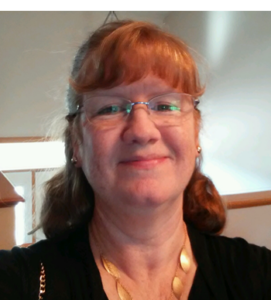What is deep listening? Spiritual director Ruth Johnston discusses the benefits of having a spiritual director who really listens.

Ruth Johnston is an ordained and board-certified chaplain. She has provided ministry and support within various healthcare institutions for 26 years. She currently offers spiritual direction virtually, by phone and in person. She lives with her husband, teen-aged son and mischievous cat in southeast Iowa and attends First Mennonite Church in Iowa City (Iowa). Learn more about Ruth on her website, spirit-word.press, or email her at rjohnston453@gmail.com.
________________________________________
Have you ever had something heavy on your heart and needed a listening ear? And have you ever had the experience of talking to someone who keeps looking over your shoulder at something or someone else? Or maybe you’ve talked to someone who keeps checking their phone? Have you ever talked with someone who barely hears you before jumping in with a story about their own similar experiences? And how did these listeners do?
Listening is rarely talked about in our culture. If it is, it tends to be viewed as a passive activity, “Don’t just listen, do something!” It’s not often seen as the valuable skill that it is.
Deep listening is challenging, focused work for the listener and potentially very valuable for the person who is being listened to.
There aren’t many things that give us such an excellent opportunity to gain insight, recognize feelings or listen to that still small voice within as having a good listener. Listening is one of the most important aspects of spiritual direction. A good spiritual director is an excellent listener, who listens deeply, not only to what is said but to what is not said. They assess and ask good questions to help open up what begs to be explored. By listening attentively, they also model for us how we can listen well for the word or movement of God.
There are other modes of deep listening, such as therapy or counseling. The difference with spiritual direction is ultimately the focus, which is the spiritual connection between the human spirit and the Holy Spirit. As thoughts and feelings are explored, the primary focus is where we feel God’s guidance in the midst of our lives. How do we discern what comes from God versus what comes from cultural expectations or ego needs? How does God lead us toward healing after woundedness? What do the tensions between competing values mean, and how do we address them? We explore these ideas and much more through spiritual direction.
Spending time both listening to our own spirit and listening to the Holy Spirit is fundamental to living a life of faith. The spiritual director is a facilitator and co-discerner,* holding open, sacred space and time for that faithful listening.
*A term coined by Thomas Greene, SJ.
Learn more about the Mennonite Spiritual Directors Network at mennosdn.org.
You can find links to the Spiritual Directors Network website and other congregational and ministerial resources on MC USA’s Church Vitality webpage: https://www.mennoniteusa.org/
The views and opinions expressed in this blog belong to the author and are not intended to represent the views of the MC USA Executive Board or staff.
Interested in submitting a blog for Menno Snapshots? Please see our blog guidelines here.


